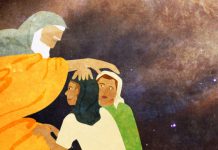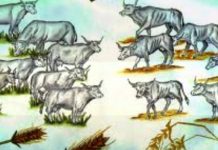Pharaoh’s Stubbornness Earns the Egyptians a Serious Beating
“Oh Exalted Pharaoh!” said Muchmud, Pharaoh’s trusty advisor. “Why don’t you let the Hebrew slaves take their 3-day vacation? Isn’t it obvious that their God has power? For an entire week we had no water unless we paid those Jews $100 a glass! Those frogs made us crazy and the wild beasts were a holy terror! Obviously, if their God wanted to destroy us, He could easily do so. So let them go for 3 days!”
“My dear Muchmad,” replied Pharaoh. “I beg to differ. As mighty as the God of Moses seems to be, I believe His power is limited. If He is really such a big shot, why does He beg for my permission day and night? Let Him just destroy us all! Why didn’t the Hebrews just leave when we were preoccupied with the wild animals and lice? Obviously, He needs my permission to leave. The 3-day request is only a ruse. They never intend to return!” (based on Ohr HaChaim)
When Moses was disappointed at his initial failure to convince Pharaoh, he came to God with complaints. “Why did You send me to make things worse for the Jews? You could have made things worse without sending me, and at least preserved my credibility as a leader!”
God replied, “Oh how I miss the oldies but goodies! Abraham, Isaac and Jacob really trusted Me. I told Abraham that his son Isaac will beget a holy nation. Then I told Abraham to sacrifice Isaac, and then said don’t sacrifice him. Abraham complied – no questions asked! But you, Moses, just started your prophecy career and already you have questions. Obviously you never saw the movie. Wait ’til the end of this story and you will understand it all.”
4 EXPRESSIONS OF REDEMPTION
God tells Moses the 4 expressions of redemption, which forms the basic theme of “4” at the Passover seder: 4 sons, 4 questions, and 4 cups of wine.
The Egyptian bondage had 3 stages: (1) Aliens in a foreign land discriminated against, (2) Slavery, (3) Torture. (Rabbi Shimshon Rafael Hirsch)
The 4 expressions of redemption correspond to these stages in the order of priorities of the suffering Jews:
- “I will take you out from under the burden of Egypt” – the torture will stop!
- “I will save you from their bondage” – the slavery will end!
- “I will redeem you with a strong hand” – no longer aliens!
- “I will take you unto Me as a nation” – it’s all over!
There is a fifth expression “I will bring you into the land” which corresponds to the fifth cup we pour for Elijah the prophet who will announce the Moshiach to bring us back to the land.
Today there even is a fifth son. He doesn’t even bother to attend the Seder.
NATURAL CHILDBIRTH
The Torah tells us the lineage of Moses and Aaron, starting with the tribes of Reuven and Shimon, and then listing Levi’s lineage until Moses and Aaron.
Question: Why not list all the tribes? Or just Levi?
Answer: The Torah does not reveal his parents’ names until this Parsha. In last week’s Parsha, we read of the birth of Moses, but it only said: “A man went out from the tribe of Levi and married the daughter of Levi” (Exodus 2:1). Over 1,000 years later, a Jewish boy went out to the gentiles to teach and they turned him into a “son of god!”
Of course the most eligible candidate for that claim was none other than Moses himself. God spoke to him in front of the entire nation, he performed open miracles (Ten Plagues, manna from heaven, water from a rock, etc.), went up to heaven for 40 days without provisions (3 times) – and no one knows where he is buried. (Why don’t we claim he flew to heaven like Mohammed? In Iraq there is a place known as Mohammed’s tomb. They had to do something with his bones!) Therefore the Torah stresses that the birth of Moses was no immaculate conception. His father was a man, and his mother a woman (natural childbirth) – no son of god.
On the other hand, the nations tell stories of men who were nobodies, simpletons, who overnight received a revelation and were transformed into “Buddha”! In Jewish tradition only someone with the proper qualities can be a prophet. So the Torah tells us God could have chosen anyone from the tribe of Reuven or Shimon or even Levi, but He specifically picked Moses and Aaron because they alone had the right qualities (Rabbi Shimshon Rafael Hirsch).
INTRODUCTION TO TEN PLAGUES
Question: If God hardened Pharaoh’s heart what happened to “free will”?
Answer: Pharaoh lost his free will as a punishment, just as Adam was banished from the Garden of Eden for misusing his free will (Maimonides).
In order to counterbalance the pressures of the plagues, God gave Pharaoh extra fortitude (a “hard heart”) in order to achieve equilibrium and ensure his free will ( Nachmanides).
Question: In the midst of terrifying plagues, how did Pharaoh rationalize not letting the Jews go?
Answer: Pharaoh thought that God was not so powerful; otherwise why would He need Pharaoh’s “permission”? What Pharaoh failed to realize was that God wanted “permission” in order to prevent the Egyptians from later claiming that the Jews are still their slaves.
God told Abraham that his descendants would suffer for 400 years (Genesis 15:13), yet we were only in Egypt for 210 years. (400 years counts from the birth of Isaac. Or because of the extreme bitterness of slavery, our time was reduced – i.e. the quality made up for the quantity.)
If God alone would have released us, the Egyptians could have claimed: “You still owe us 190 years!” In the end, Pharaoh officially freed us.
LESSONS OF THE TEN PLAGUES
Lesson #1 – The Ten Plagues were a confrontation with “black magic.”
The “primitive ancients” of Egypt outdid modern technology! They knew how to mummify bodies, build pyramids and developed black magic into an art. When Aaron’s staff turned into a serpent, Pharaoh called the kindergarten children who all did the same. It was like presenting a cigarette lighter to MIT! (Rabbi Noah Weinberg based on Midrash)
However, when Aaron’s staff swallowed all the serpents, that was above the power of black magic.
The magicians duplicated blood (after buying water from the Jews), and reproduced frogs (in trying to remove the frogs, they brought even more! – Rabbi Hirsch) but they could not reproduce lice – which were too tiny for their spell to have effect (Rashi). The Egyptians had to admit it was a “finger of God.” (But they didn’t give God credit for any more than a finger!)
Lesson #2 – The Ten Plagues corresponded to the “10 Utterances of Creation.”
At Creation, God said: “Let there be,” 10 times. The plagues confirmed that He controls water, fish, amphibians, animals, insects, atmospheric conditions (hail and darkness) and human beings. (How could anyone know who a first born is?)
At creation, there were no witnesses. (Adam was a “post facto” witness.) This time, all mankind was aware. Cairo Headline News: “Read all about it! Plague hits Egypt! Nile turns to blood! Red Sea splits!”
Lesson #3 – The Ten Plagues established the fundamental principles of Judaism. (Nachmanides)
The Egyptian philosophers had 4 schools of thought:
- They denied the Creator. The world is infinite, no beginning and no end.
- The Creator has no interest in the world. “After Creation He went to play golf!”
- The Creator has no power to change the laws of nature. “There’s no such thing as miracles.”
- They denied prophesy. Why would the creator communicate with a human being, who is nothing more than a highly evolved cockroach!
The Ten Plagues demonstrated before the eyes of all mankind that:
- God created the world.
- God cares about our deeds. (“Let My people go!”)
- God can change the laws of nature.
- God communicates with humanity. Moses is a true prophet, subsequently establishing Moses’ credibility for the rest of the Torah as well.
Lesson #4 – Warnings: The first 9 plagues are divided into 3 sets with a specific pattern.
Plagues #1, 4 and 7 were preceded by warnings at the Nile river. The Midrash explains that Pharaoh made himself into a deity. His pencils didn’t have erasers. And Pharaoh didn’t even have toilets in his palace! However, unknown to the masses, he had a quaint custom of taking an early morning swim in the Nile. God told Moses to meet Pharaoh at the river and warn him of the oncoming plague. “Please let me take a swim!” Pharaoh begged, his bladder exploding!
Plagues #2, 5 and 8 were warned in the palace in front of all his people, and #3, 6 and 9 were without warning as a punishment for not listening until then.
VIVID DESCRIPTION OF THE TEN PLAGUES
(1) Blood – This was the real thing, not red dye! All the fish died. The Egyptians worshiped the Nile River, the source of their prosperity.
The Jew would fill a cup of sparkling cold water from the Nile and proceed to drink. The Egyptian filled a cup of “blood.” “Give me your cup,” the Egyptian demands and grabs the water from the Jew’s hand. As soon as he puts it to his lips, it becomes “blood.” “Refill it, Jew!” and they proceed to drink it at the same time. The Jew drinks water, the Egyptian “blood”!
The lesson? We all live in our own worlds. They just happen to coincide at the same time and place! (Rabbi Yerucham of Mir)
For $100 a glass, the Egyptians could also enjoy water. Measure for measure: They kept the Jews thirsty in the hot sun, so now they knew thirst.
(2) Frogs – Pharaoh frog-proofed his palace like a sealed room. A big sign proclaimed: “No Frogs Allowed!” Pharaoh sat smugly on his throne as the frogs all banged against the window: “Let us in!” Every day Pharaoh opened the mail slot a tiny crack so they can squeeze in his pita bread for the day.
One little frog proclaimed: “God said into the ovens! Someone has to go!” This frog sneaked into the dough and is baked into the pita, miraculously surviving. (This is the forerunner of Daniel’s 3 friends – Chananya, Meshael and Azarya – who learned from the frogs to do likewise.)
Upon entering the palace – and Pharaoh’s stomach – this little frog begins croaking the daylights out. Pharaoh screams for help, opens the door and in rush all the frogs! In the end they all died, leaving smelly frog corpses throughout the land of Egypt.
Measure for measure: The Egyptians deprived the Jews of sleep by making them work into the night. Now they couldn’t sleep, due to a symphony of frogs.
(3) Lice – Until now, the plagues were an inconvenience. Now they became a painful punishment. Measure for measure: The Egyptians didn’t allow the Jews to bathe, so the Jews were covered with lice. Now the Egyptians could enjoy that same experience.
(4) Wild Beasts – “Lions and tigers and bears, oh my!” When the plagues began, the Jews stopped working harsh labor. The Egyptians decided to utilize the poor unemployed Jews for domestic chores. “Take my 10 children for a picnic in the park, Yossi.” When Yossi returned with no kids, they cried out: “Where are my children?” “I believe, sir, that the first one was eaten by a lion. Two more by the tigers and leopards. I noticed a python devouring 3 more, and the rest I left hugging the bears” (Midrash).
Measure for measure: The Egyptians made the Jews hunt wild beasts for them as sport.
(5) Cattle Plague – The pride of Egypt – their horses, camels and livestock — all perish. (Only the ones in the fields, not those in the barns.) This time Pharaoh checks out the district of Goshen. Not one cow died. God can tell a Jewish cow as well!
Measure for measure: The Egyptians forced to Jews to work harsh labor with livestock.
(6) Boils – Three plagues were performed by Aaron, 3 by Moses, and 3 directly by God. The plague of boils was a joint project of all 3. Moses and Aaron filled their fists with soot from the furnace (used as a cure for boils in the ancient world) (Rabbi Shimshon Rafael Hirsch). Miraculously all 4 fistfuls fit into Moses’ one fist and he threw it up to the sky. God thereupon spread it throughout the land of Egypt where it caused boils on all people and animals.
Even the magicians who until now were somehow able to prevent themselves from suffering now enjoyed the boils with the rest of the rabble.
Measure for measure: The Egyptians beat the Jews constantly so that their bodies were covered with sores. Once again, the third of the series is painful, a punishment for the first two.
(7) Hail – A total atmospheric change for Egypt where it rarely rains. Interspersed with the hail was fire. Water and fire made peace to punish the Egyptians.
Moses warns the Egyptians to bring their cattle (those that remained from the cattle plague) into the house. Not into the barn, but into the living room to experience the crowded living conditions of Goshen, where 20 Jewish children shared a room.
Those who feared God brought them in. Those who “didn’t pay attention to the words of God” (teaching us that the definition of fearing Heaven is taking His words seriously) left them outside where they were destroyed.
Measure for measure: The Egyptians stoned the Jews, and got it in return, on their heads.
The result of all this? Pharaoh receives a spiritual education: At first, Pharaoh says, “I don’t know God.”By the end of the Parsha, he begs Moses: “Pray to God for me … I have sinned to God … God is righteous.” (God had warned Pharaoh about the hail. Since when do people warn their enemies?) Although Pharaoh was wicked, at least he had a concept of righteousness. Modern-day Pharaohs would have said: God is stronger and might makes right!
The Ten Plagues continue next week.












